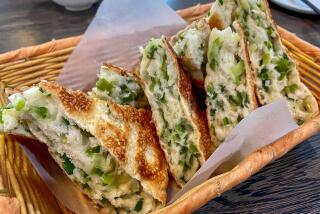Got Bread?
- Share via
It’s only in the last two centuries that people have furrowed their brows and asked, “Why is there poverty in the midst of plenty?” Before that time, poverty wasn’t exceptional; most people were shockingly poor by our standards.
Back then, having enough of a staple food such as bread, rice or corn meant the difference between survival and starvation. Many parts of the world retain a custom that when you drop a piece of bread or grain of rice on the floor, you must pick it up and put it back on the table, possibly kissing it as well, to show respect. In some Middle Eastern countries, children are told that on Judgment Day, they will be required to pick up every grain of rice they’ve ever wasted--using their eyelashes.
In such a hungry world, a monotonous diet was just fine with many people as long as there was enough of it. But of course, one does not live on bread alone if one can help it. The Chinese word for a meal is fancai, which means “rice and something to go with it.”
The bread-eating world has some equivalent words meaning “something to go with bread.” In ancient Greek, it was opson or opsarion; in classical Arabic, ‘ida^m; in the Turkish language family, qattiq. With time, the Arabic word came to mean a spicy dip. Turkic peoples applied the word qattiq to yogurt so often that in some languages, such as Uzbek and Kazakh, it simply crowded out the word “yogurt.” In ancient Athens, opsarion usually meant fish; in fact, in modern Greek it is the word for fish (psari).
More to Read
Sign up for Essential California
The most important California stories and recommendations in your inbox every morning.
You may occasionally receive promotional content from the Los Angeles Times.











